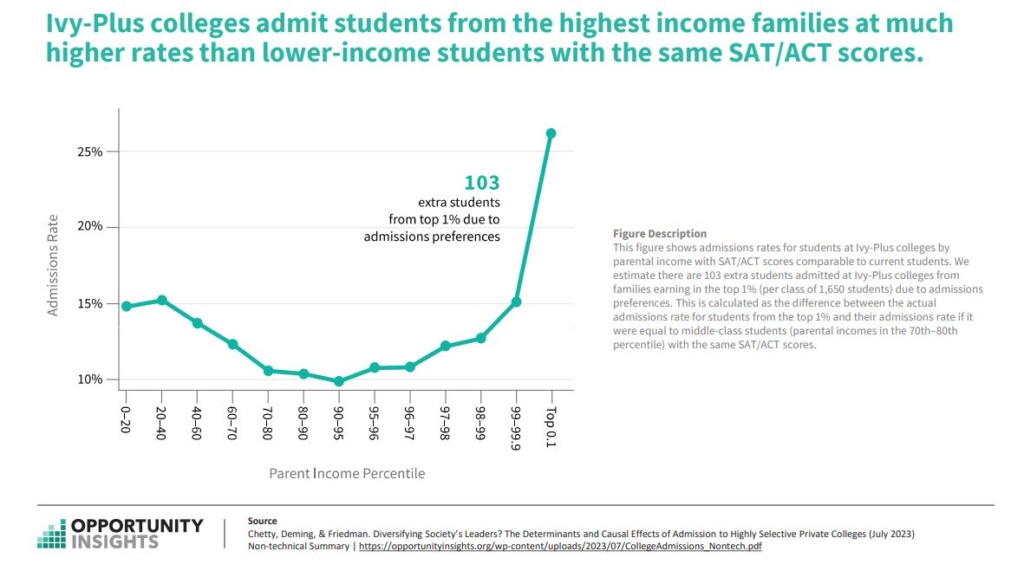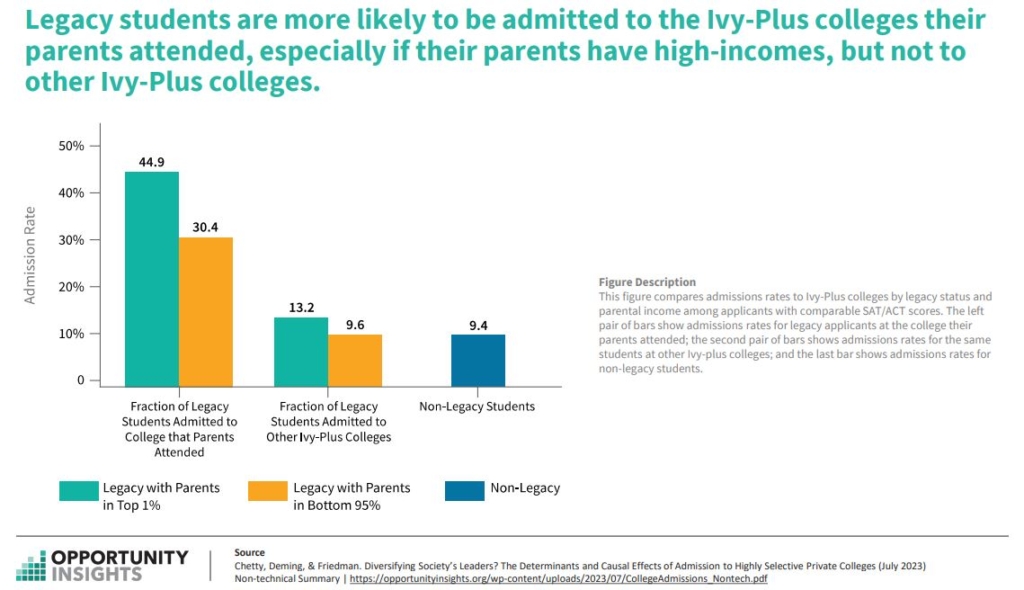
Harvard University in Cambridge, Mass., was one of two schools at the center of the Supreme Court’s ruling ending race-based affirmative action.
If you want to make it to the upper echelons of American society and leadership, follow this simple formula: Attend an Ivy League college.
A new working paper from Opportunity Insights shows that while less than 1% of Americans attend the 12 Ivy and Ivy-Plus colleges (Stanford, MIT, Duke, and Chicago University), graduates from these schools account for a staggering 10% of Fortune 500 CEOs, a quarter of U.S. Senators, half of all Rhodes scholars, and three-fourths of Supreme Court justices appointed in the last
half-century.
And, if you want to get into an Ivy League or Ivy-Plus college, there’s an even simpler formula: Come from a very, very rich family.
According to the study, students coming from families in the top 1% of the income distribution are 34% more likely to attend Ivy-Plus colleges compared to their lower-earning counterparts, even when having similar SAT or ACT scores. The very, very, very rich – those in the top 0.1% – are more than twice as likely.
WEALTH IS ITS OWN AFFIRMATIVE ACTION
Last month, The United States Supreme Court ruled that race-based admissions violates the Equal Protections Clause of the 14th Amendment, effectively killing affirmative action for college admissions. Schools had long used race, along with a slew of other factors, as a consideration in admissions in order to increase diversity in their student bodies. Two separate suits led to the ruling, one at Harvard University and one at the University of North Carolina.
What the Supreme Court ruling didn’t touch on is the tacit affirmative action for children of the very rich through practices like legacy admissions, athletic recruiting, and having the time, support, and money to spruce up their resumes and non-academic attributes.
Some observers have said the Harvard case in particular is a crisis of its own making.
“How can the university defend ‘affirmative action’ for poor students of color while aggressively engaging in affirmative action for affluent Whites?’” Evan Mandery, a professor at City University of New York’s John Jay College of Criminal Justice, wrote in an Op-Ed last year, months before the Supreme Court’s ruling.
Mandery is author of “Poison Ivy: How Elite Colleges Divide Us,” a damning history of how Ivy League schools have helped develop and maintain an economic system in the United States that works to keep the rich rich while building barriers to economic mobility for the poor.
“Who goes to Wharton, and Tuck, and Harvard Business School makes a huge difference on national policy in the same way that who goes to Harvard Law School and Penn Law School makes a huge difference,” Mandery told Poets&Quants last year in advance of his book.
“I think when you look at the boards of these institutions, they are so disproportionately white and old that it’s easy to see why they are conservative in the traditional sense: They reinforce the status quo and they’re resistant to change. Diversifying the elite has long term policy implications. At a moment in history when I think anybody who’s paying attention is really worried about the future of democracy, I think these institutions have not done their bit, and they need to start doing it right away.”

TEST SCORES DON’T GIVE RICH STUDENTS AN EDGE
Now, this large study seems to affirm at least part the critics’ arguments. “Diversifying Society’s Leaders? The Determinants and Causal Effects of Admission to Highly Selective Private Colleges” was released Monday by Raj Chetty and David Deming of Harvard University and John Friedman of Brown University – all affiliated scholars with the National Bureau of Economic Research. It highlights the disproportionate representation of graduates from highly selective private colleges in leadership positions across the United States by delving into the admissions policies of these institutions.
A key finding of the study is that it’s not higher GPAs or SAT/ACT test scores that give the richest students the edge; They get no such advantage at flagship public universities. Instead, the advantage is based on precisely the three factors Mandalay and other critics have warned against: legacy admits, highly curated résumés, and athletic recruitment. Further, students from rich families, even with similar academic outcomes as their less wealthy counterparts, apply to these elite schools and end up matriculating into the classes at higher rates.
“Using a new research design that isolates idiosyncratic variation in admissions decisions for waitlisted applicants, we show that attending an Ivy-Plus college instead of the average highly selective public flagship institution increases students’ chances of reaching the top 1% of the earnings distribution by 60%, nearly doubles their chances of attending an elite graduate school, and triples their chances of working at a prestigious firm,” reads a summary of the study.

IVY LEAGUE ‘DOESN’T WANT LOW-INCOME STUDENTS’
The study looked at federal records on college attendance and family income taxes for most college students from 1999 to 2015.
“What I conclude from this study is the Ivy League doesn’t have low-income students because it doesn’t want low-income students,” Susan Dynarski, an economist at the Harvard Graduate School of Education, told the New York Times.
The study also found that merely attending an Ivy-Plus instead of a flagship public college triples students’ chances of obtaining jobs at prestigious firms and substantially increases their chances of earning in the top 1%. Further, 15% of the top 0.1% richest people in the country themselves attended an Ivy or Ivy-Plus school.
Other key findings include:
- Students from affluent families apply to highly selective private colleges at slightly higher rates than their lower-income counterparts, accounting for 20% of the income gap in attendance based on SAT/ACT scores.
- Higher admissions rates for high-income students explain two-thirds of the difference in enrollment rates at Ivy-Plus colleges.
- 24% of the admissions advantage for students from the top 1% of families can be attributed to the recruitment of athletes, who tend to come from higher-income backgrounds.
- 46% of the admissions advantage arises from preferential admission for legacy students—those whose parents attended the same college. Legacy students from high-income families are five times more likely to be admitted than average applicants with similar credentials.
- The remaining 30% of the admissions advantage for high-income students is attributed to their stronger non-academic credentials, such as extracurricular activities and leadership traits. This advantage is found to be influenced by the high schools attended by the applicants. Students from non-religious private high schools are twice as likely to be admitted as those from public high schools in affluent neighborhoods, even when accounting for test scores, demographics, and parental income.
TWO CRUCIAL QUESTIONS
The study raises two crucial questions: Do highly selective private colleges perpetuate the persistence of privilege across generations by favoring students from high-income families and propelling them into high-status, high-paying leadership positions? And, to what extent could these colleges contribute to diversifying society’s leaders by reforming their admissions practices?
After the Supreme Court ruling, several elite universities and their business schools released statements reaffirming their commitment to admitting people from diverse backgrounds, including the two schools at the center of the original cases.
“We write today to reaffirm the fundamental principle that deep and transformative teaching, learning, and research depend upon a community comprising people of many backgrounds, perspectives, and lived experiences. That principle is as true and important today as it was yesterday. So too are the abiding values that have enabled us—and every great educational institution—to pursue the high calling of educating creative thinkers and bold leaders, of deepening human knowledge, and of promoting progress, justice, and human flourishing,” wrote Harvard University President Lawrence Bacow and co-signed by all Harvard deans.
Good news for them: The study found that the Ivy-Plus colleges could significantly diversify the socioeconomic backgrounds of America’s highest earners and leaders by changing their admissions policies. By placing greater emphasis on academic credentials and reducing the weight placed on legacy and non-academic factors, these institutions could pave the way for a more equitable and diverse representation of leaders in the country.
DON’T MISS: WHAT THE SUPREME COURT’S BAN ON AFFIRMATIVE ACTION MEANS FOR ADMISSIONS AND PURDUE NAMES A NEW B-SCHOOL DEAN — AND GIVES HIM A HUGE GOAL











Questions about this article? Email us or leave a comment below.